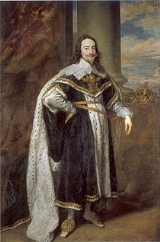
, King of Scotland
, and King of Ireland
from 27 March 1625 until his execution in 1649. Charles engaged in a struggle for power with the Parliament of England
, attempting to obtain royal revenue whilst Parliament sought to curb his Royal prerogative
which Charles believed was divinely ordained
.
1625 Charles I becomes King of England, Scotland and Ireland as well as claiming the title King of France.
1625 King Charles I marries Henrietta Maria of France, Princess of France
1628 Writs issued in February by Charles I of England mandate that every county in England (not just seaport towns) pay ship tax by this date.
1628 The Petition of Right, a major English constitutional document, is granted the Royal Assent by Charles I and becomes law.
1640 King Charles I of England dissolves the Short Parliament.
1640 Second Bishop's War: King Charles I's English army loses to a Scottish Covenanter force at the Battle of Newburn.
1640 The Treaty of Ripon is signed, restoring peace between Scotland and Charles I of England.
1642 King Charles I of England sends soldiers to arrest members of Parliament, commencing England's slide into civil war.
1642 From this date all honours granted by Charles I are retrospectively annulled by Parliament.
1642 Charles I calls the English Parliament traitors. The English Civil War begins.
I go from a corruptible to an incorruptible Crown, where no disturbance can be, no disturbance in the world.![]()

